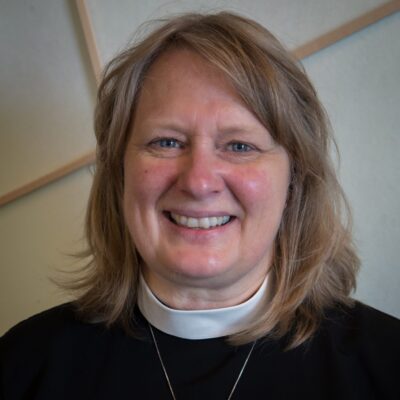There are three traditions about this particular Sunday in the church year. The first is that it is unofficially known as “Low Sunday” because many who showed up for Holy Week and Easter feel like they attended church much more often than their normal pattern and others get to Easter Day and figure they got all the high points and can take a break until next Advent!
The second tradition is linked to the first. Often the preacher for the Second Sunday of Easter is not the Vicar or Rector. Like many parishioners, the Vicar may feel like they did more than their fair share of preaching and leading services during Holy Week and Easter and they deserve a day off so they assign the preaching to an Associate.
The third tradition on the Sunday after Easter is that we always hear the story of Thomas and his unwillingness to believe in the resurrected Christ until he has the opportunity to touch the wounds in the hands and side of Jesus. You may have heard me call Thomas the “patron saint of Episcopalians” although this is not an official designation. It’s just that many of us who have gravitated to this denomination did so because it seems to be OK with asking questions and raising doubts. We often hear that the opposite of faith is not doubt, but rather fear. Thomas is definitely not afraid. While the other 10 disciples are holed up behind locked doors, he’s out and about and as a result isn’t present for the first appearance of the resurrected Christ.
If you’re in church this Sunday it may be because you weren’t aware of these traditions, weren’t paying attention to the church calendar, especially like Thomas or were hoping that the Vicar wouldn’t be preaching!
Or it may be something else. It may be that you’re here because you received new life in the Easter celebration or were inspired by the presence of the Spirit. You may be renewed in your faith and fairly serious about following Jesus and living into Easter faith, hope and love. You may be one of the fifty folks who showed up for St. Luke’s first Easter Vigil in a long time and were moved by the power and beauty of the liturgy, readings and sermons.
For whatever reason you are here this morning, I am so glad. I am so glad to unpack with you the message of Jesus and the call to live into the resurrection. We bring our doubts and our fears as well as our awe and worship and praise. Together with Thomas we come close to Christ to touch his wounds, to hear his blessing of peace and to receive the Holy Spirit.
But how do we get close? After all the resurrected body is no longer with us. The miraculous manifestation of tongues of fire aren’t visible here today. We are those who have not seen, but we want to believe. We are those who ask of God, “Lord, help my unbelief.” We want to be close to God, but often we feel so distant. We can’t put our fingers in the nail holes or our hands in his side. We can’t share a meal of bread and fish with him or hear him bless us with peace.
Distance. It’s hard to bridge the distance of time, the distance of a different culture, the distance of separation. It’s especially difficult to bridge the distance of privilege.
The privilege of distance. It’s a phrase I had never really heard until this past Friday. I heard it in a song. The song was written and sung by a woman whose neighbor had been killed by recently armed campus security officers in Portland. He was a father and grandfather. He had stepped in to break up a fight outside a bar. He was succeeding as the security officers arrived. A few minutes later he had been shot dead.
Her kids had played with his kids. They had shared block parties with him and his wife. They lived in a decent neighborhood just a few doors down from one another. They attended the same church. They were close, good neighbors. And he was shot dead.
But there was a distance between them. A distance that she didn’t even fully comprehend or realize until he was dead. A distance that she didn’t understand but he did. A distance that got him killed. In their church, his family was one of only two black families. On that sidewalk, in front of the bar, he was the only person of color. The distance between them was the distance created by privilege, the privilege of whiteness. It is the privilege of not having to worry about being automatically considered a suspect because of skin color. It is the privilege of not being automatically branded a threat because you are a black male. And it’s the privilege of not having to think about these things consciously or unconsciously every minute of every day. The privilege of distance.
Jesus breaks down that privilege. At his birth, Jesus moves into the neighborhood. He pitches his tent amongst us. At least that’s the Eugene Peterson translation from the Message. I think about that every time I pass one of the many tents dotting our city, in parks, on sidewalks, under freeways. Jesus pitched his tent in the middle of suffering, desperate humanity.
Jesus doesn’t keep his distance, not from lepers, or foreigners, the diseased or dead. He talks to prostitutes and heals menstruating women. He shares meals with the despised and rejected and even shares a cup with the one who will betray him. With Jesus, it’s all personal, it’s all close, it’s all real. At the end he suffers the fate of the indigent, the petty thieves, the rabble rousers, the ones with no power to save themselves. He dies a death so awful that only his mother and a few, mostly female followers can bear to be present during his suffering.
And then, when his friends are keeping their distance from everyone, behind locked doors, he breaks down every barrier, including that most permanent one, death to be with them. He stands in the midst of them. He invites them to come close. He offers the sign of peace. And when Thomas misses that opportunity, he comes close again, just for him. He comes close enough so that Thomas can touch the marks of his wounds.
After that, the disciples have lost the privilege of safety and security. They have touched the death of Jesus and been transformed by his resurrection into those who go out into the world with the message of this boundary-breaking love which destroys the walls we build between one another.
Oh we are an Easter people, a people marked by the cross and propelled by the resurrection. We are a people who can no longer be ignorant of the distance that separates us from the suffering and crucified ones. We can no longer offer our peace from afar, our thoughts and prayers, our check to help the needy. We can no longer avoid getting our hands dirty and even bloody as we care for those who have fallen and bind up the wounds of the victims. Because the Lord of life has breathed the Spirit upon us, we can no longer walk away from death or to keep ourselves racially and economically isolated.
It may not be safe. As one commentator put it, “The apostolic movement is a political enterprise that lives in tension, if not contradiction with established order in the world.” To abandon the privilege of distance is to become as vulnerable as the vulnerable. It is to question and doubt even those we have been taught to respect and rely on.
When we get close enough to touch the wounds of Christ, we will find ourselves in direct contact with the poor, the hungry, those who are strung-out and mentally ill. We may get to know drug users or even drug dealers. We will be able to see and hear the stories of those who have been sexually harassed or assaulted. We will bring flowers to the site of shootings and we will walk in protest when our community failing the vulnerable.
We will open our doors to those in need, and like we did yesterday, we will provide the space and opportunity for friends and family to mourn when their 30 year old, beloved Ryan has died on the streets after suffering from years of anxiety, pain and addiction. We will join in mourning for Christian sisters and brothers in Sri Lanka and for our Jewish neighbors in San Diego. We will find ways to proclaim and act like Black Lives Matter and confront the ingrained racism that even now keeps our congregations mostly segregated on Sunday mornings.
And we will do so, not because we are so strong, or principled or even woke! We’ll do so because we have received the Spirit of God, the Spirit not of timidity but of courage in the name of Jesus. We will act because we have touched the risen Christ in the bodies of our wounded sisters and brothers… AND IN OUR OWN WOUNDS. We have seen the power of God to bring new life out of death and to redeem even the most hopeless situation. Because of the love of Jesus, we will forgive and ask for forgiveness.
And we will know that “Resurrection means the worst thing is never the last thing.” It won’t be our certainty, our strength or even our own courage that propels us from this place but rather the wounds of the Lord Jesus Christ who gave himself for us an offering and sacrifice to God on behalf of the world. Amen.







